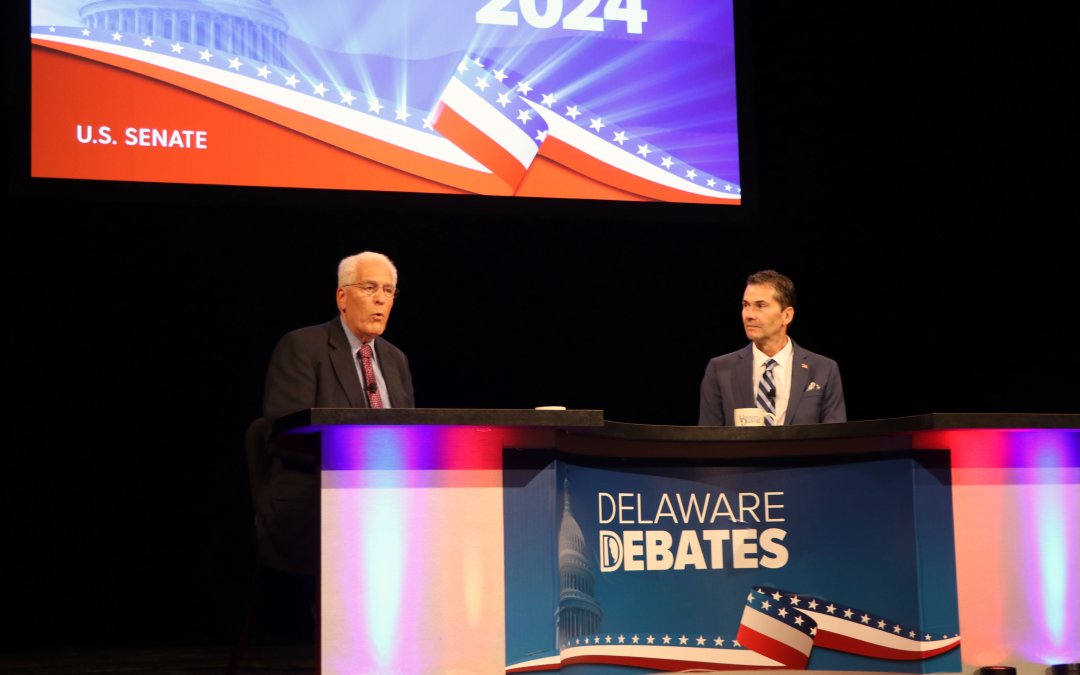NEWARK – Sarah McBride, the Democratic nominee for Delaware’s sole U.S. House seat, laid out her policy goals in a moderated discussion at University of Delaware’s Mitchell Hall on Wednesday, reiterating her agenda to potential voters with less than three weeks until election day.
The event was intended to be a debate with Republican opponent John Whalen, though he declined to attend. McBride instead used the platform to echo her position on the economy, including calls for “targeted” student debt relief and lower cost of higher education.
“This is without question the top issue that I hear from voters as I travel up and down the state: the cost of housing, the cost of child care, the cost of healthcare,” McBride said, calling it her “singular focus” if elected.
McBride is dominating in the polls against Whalen, leading by 21 percentage points in a head-to-head survey conducted by the University of Delaware Center for Political Communication from Sept. 11-19. If elected, McBride would be the first openly transgender person to serve in Congress.
In both the House and Senate races, the Democratic nominee is heavily favored to win the general election. A reliably blue state, Delaware has not elected a Republican to Congress since 2008.
McBride also voiced concern about a lack of economic opportunity for younger generations.
“We shouldn’t be giving someone who is making seven figures after getting their law degree from Yale student loan relief,” McBride said.
McBride has been credited with influencing President Biden’s support for LGBTQ rights and protections. However, when asked about this, she said that she only wanted her candidacy to focus on policy.
“I’m not running to be known for any one aspect of my identity. I’m running to be Delaware’s member of Congress, focused on all of the issues that matter. Similarly, I’m not running to be a spokesperson for a movement. I’m running to be a voice for Delawareans,” McBride said.
McBride also raised the importance of electing members of Gen-Z to government office, as it “guarantees that we have the diversity of thought” to address issues affecting the entire population. She noted that she “would be the youngest member of the federal delegation, since then-Senator Biden was sworn in in 1972.”
Asked about the conflicts in Ukraine and the Middle East, McBride voiced support for continued security assistance to Ukraine and Israel, calling for a ceasefire, the release of all hostages, and a two-state solution with a Palestinian state long-term.
She also called for term-limits for Supreme Court justices, action to address climate change, and opposition to abortion restrictions.
McBride spoke in favor of physician-assisted suicide (PAS), an issue that the state legislature had passed but which was vetoed by the governor. McBride described PAS as a means to give the terminally-ill control over their remaining life, and tearfully recounted her experience with her husband, who had died of cancer four days after their wedding.
“There was the anxiety over the indignity of feeling a complete loss of individual agency over his own life and over his own future,” she recounted.
“We can’t tell [people with terminal illness] what happens on the other side of death, we can’t necessarily alleviate that fear of death. But if we have the capacity to give people back that little bit of individual agency and how that end occurs.”
Senate race
An hour after McBride’s debate, Republican U.S. Senate nominee and former Walmart executive Eric Hansen took to the stage.
Democratic nominee and incumbent U.S. Representative Lisa Blunt Rochester declined to participate, while Independent Party nominee and former Democratic State Senator Michael Katz was denied access due to lacking a sufficient number of donors.
Hansen, who would need wide crossover appeal to win an election in this deep-blue state, described himself as a “sensible Republican” and political newcomer who will foster bipartisanship, compared to his “career politician” opponent.
The September poll conducted by the University of Delaware found Blunt Rochester leading Hansen by 20 percentage points, with Katz in a distant third, taking only 6% of the total vote.
Hansen argued for cuts to government spending across the board, including to entitlement programs such as Medicaid and the Supplemental Nutrition Assistance Program (SNAP).
After the debate, Hansen was asked by Medill News Service about these plans, as well as whether he sees government work as differing from that of private enterprise, as Walmart is one of the top employers of SNAP and Medicaid beneficiaries due to its low pay and benefits.
“What I loved about my job at Walmart wasn’t that we had lots of workers on SNAP, for sure,” Hansen said. “It was because my job at Walmart was running a business where my job was to give people products at half the price of national brand, and really changed their lives for the better.”
Hansen continued that government agencies can afford “to cut costs by 2% every single year. They’re going to figure out a way to do that.”

